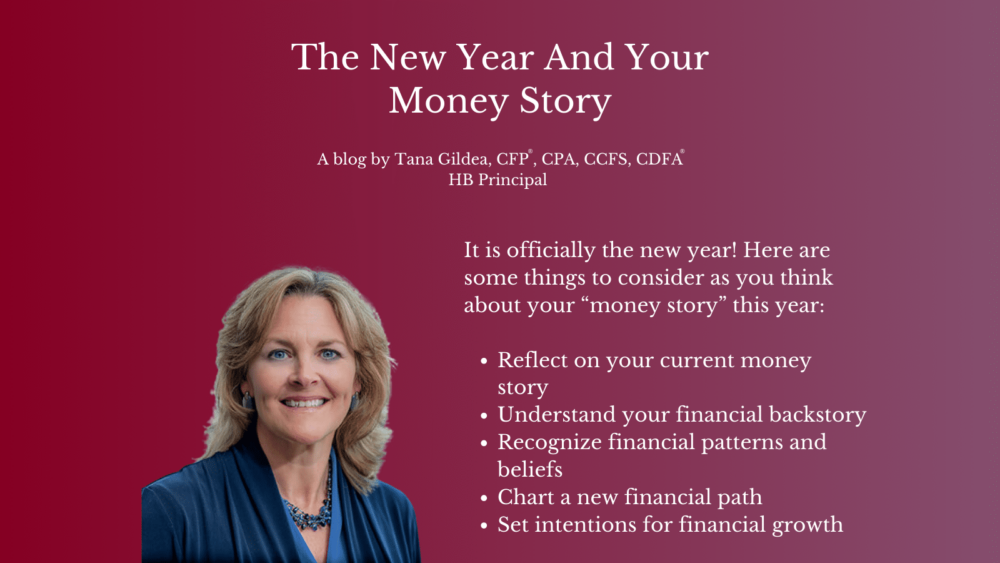The New Year is a time filled with anticipation, expectation, and possibility. Most of us see the promise of a better self, situation, or future. We look to shake off the baggage of the old and start fresh. But as much as you may want to put last year into your rear-view mirror, your money story is in the driver’s seat with you.
Reflecting on Your Current Money Story
January is already behind us, so today is the day to evaluate how your money story works for you and consider if you are on a path to a better self, situation, or future by the end of 2025.
What money story are you bringing into the New Year?
- Abundance or scarcity?
- Ease or struggle?
- Fear or delight?
- Shame or confidence?
- Debt or security?
Stop and think about your relationship with money; we all have one, whether we acknowledge it or not. That relationship brings up feelings, whether we like to confront them or not.
Understanding Your Financial Backstory
Money isn’t a subject most want to discuss, especially when it relates to personal mistakes or feelings of inadequacy. But during this time of possibility, it’s the perfect moment to write the plot of the story you want to live. Envision the happy, ecstatic, abundant ending you desire, and start taking baby steps to get there.
When writing (or reading) a story, you need to know where the character starts. As the author of your money story, you must understand:
- What happened in your financial past
- Struggles you’ve faced
- Lessons learned from mistakes and missteps
You can’t achieve your desired ending without acknowledging everything that came before.
Recognizing Financial Patterns and Beliefs
As kids, we pick up messages about money without fully understanding them:
- We sensed if money caused tension between our parents.
- We noticed if it seemed hard or easy to obtain.
- We learned unspoken rules about what “people like us” could expect financially.
These emotional memories stick with us into adulthood, even as our understanding of money evolves. We may still feel shame or fear around past financial mistakes, leading to behaviors like avoiding financial decisions, delegating them to a partner, or labeling ourselves as “just not good with money.”
Charting a New Financial Path
What money emotions and labels are you bringing with you into the New Year?
If your feelings about money, your ability to earn, manage, save, and grow it, are not positive and confident, it’s time to:
- Probe the emotions around money.
- Delve into your money past to uncover the roots of your perceptions and philosophies.
- See your younger self with compassion, using lessons learned as fuel for growth.
Understanding the source of your emotions is key to reframing them. For example, feeling anxious about money because of childhood experiences doesn’t mean that anxiety has to define your financial mindset as an adult.
Setting Intentions for Financial Growth
As you reflect on your emotions around money, ask yourself:
- How do I want to feel about money and my abilities to earn, manage, and accumulate it?
- Confident
- Secure
- Hopeful
- Proud
If that’s not how you feel now, consider: How can you write your own plotline to lead you from where you are now to your own happy, ecstatic, abundant ending?
It’s a new year, full of new possibilities. You get to choose how it ends. Write your story, line by line, step by step, chapter by chapter, as you overcome fears and doubts to create the life you want. Acquire the knowledge and skills needed to feel competent with your financial decisions.
Let’s meet here next year feeling more confident, more secure, more hopeful, and prouder of our own money stories and the progress we’ve made.
If “feeling more competent and empowered” is part of how you want to feel this year, join me for my free 60-minute webinar, Let’s Talk Taxes, on February 18th at 12:00 p.m. EST. Even if you can’t attend, those who register will get a link to the video and the slides after the event. Click here for more information and to register. I’ll be doing webinars throughout the year so watch for more details about these upcoming free events.
To learn more or get help planning your financial goals, please email me at gildea@homrichberg.com.
Important Disclosures
This article may not be copied, reproduced, or distributed without Homrich Berg’s prior written consent.
All information is as of date above unless otherwise disclosed. The information is provided for informational purposes only and should not be considered a recommendation to purchase or sell any financial instrument, product or service sponsored by Homrich Berg or its affiliates or agents. The information does not represent legal, tax, accounting, or investment advice; recipients should consult their respective advisors regarding such matters. This material may not be suitable for all investors. Neither Homrich Berg, nor any affiliates, make any representation or warranty as to the accuracy or merit of this analysis for individual use. Information contained herein has been obtained from sources believed to be reliable but are not guaranteed. Investors are advised to consult with their investment professional about their specific financial needs and goals before making any investment decision.
©2025 Homrich Berg.













A Deeper Look At The U.S. Labor Market And How It Continues To Support Consumer Spending
Last month, we discussed how recent inflation data could influence the Federal Reserve’s (Fed) decision…
Read More